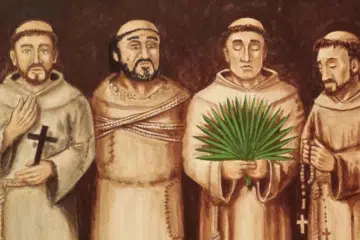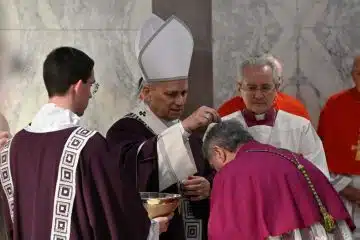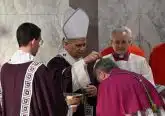The value of the Lenten sacrifice
January 23, 2012
By Father Earl Fernandes
Very soon the season Lent begins, and many old questions and dilemmas return. Should I give something up? Why do people give things up? Why can’t we eat meat on Fridays in Lent? Why do we have days of fast and abstinence? And, finally, does it all matter?
These really are important and fascinating questions because they come from some of the most ancient and cherished traditions of our faith. Asceticism, or a penitential way of life, was very much part of the early life of the church. There was a real understanding that we could become so attached to the comforts of this world that we would lose sight of the seriousness of our hope for salvation and our desire to see the Lord. The anchorites of the desert immersed themselves in the wilderness and there scoured the Scriptures seeking wisdom and insight into the meaning of our relationship with God and our hope for salvation.
It was a custom that was also know to the ancient Hebrews. The Dead Sea Scrolls were written by a monastic community known as the Essenes, who went into the desert with the books of the prophets, especially Isaiah. There, they spent their time seeking answers to the questions about who would come and deliver Israel. A great scholar of the last century, Cardinal Jean Danielou, speculated that the power of the message of John the Baptist was nurtured and honed in this community.
They felt that the solitude of the desert brought them closer to touching the mystery of the presence of God. Jesus himself honored this tradition with His 40 days of fasting in the desert where He, too, encountered the power of earthly evil, but chose the Father instead. There was a sense that the freedom to seek that which was most significant about our world gave us the ability to choose more completely the great gift of salvation.
Besides looking for freedom from those things that hold our senses and appetites bound, there was also a sense of coming to understand the great gifts we enjoyed and the hardships of other peoples’ lives. This is where the not eating meat on Fridays came from.
There is evidence in the Didache of the apostles and Clement of Alexandria that this was a serious obligation for Christians. Friday was especially important because that was the day of the Lord’s death. Not only a sacrifice of thanksgiving for the great gift of the Lord’s life was important, but abstention from all flesh was seen as a sign of respect. In the early Middle Ages, the fast was universally imposed for an interesting reason. The poor seldom, if ever, could have meat in their diets. Only the wealthy and the nobility had that privilege.
The popes imposed abstinence on Wednesdays and Fridays to help the wealthy understand how exceptional their lifestyles were and sensitize them to the plight of the poor. It was hoped that solidarity with the poor would encourage generosity toward the less fortunate.
All this provides reasons to sacrifice during Lent, freeing ourselves from excessive attachments to this world’s pleasures. Sacrifice can free us to look beyond the present into the promise that lies ahead. Sacrifice helps raise awareness of our abundance and the struggle of others even to survive. We can do so in thanksgiving to God for the body and blood of His Son, given for us on the cross.
These practices remind us of the importance of looking more deeply into our faith, as we, with the vast community of men and women with whom we have shared this faith throughout the millennia, await that blessed hope and the return of the Savior. Lenten sacrifice reminds us that we are not alone, but members of a great multitude of disciples, who have prayed, suffered and died for the faith, from the days of ancient Jerusalem to the persecutions and martyrdoms of our age.
We are a people who live in a passing world in hope of eternal life, who believe and trust in God enough to sacrifice for others and for Him as we await His resurrection from the dead and His return in glory.
Father Fernandes is an assistant professor of moral theology and dean of the Athenaeum of Ohio/Mount St. Mary’s Seminary.













